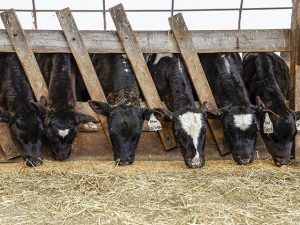
A 100-cow century dairy farm is available due to impending retirement of owners. Minimal investment required: $1 million for start-up with an additional $500,000 line of credit. Expected financial return: Above minimum wage.
Must be willing to live on site, be available for work 24 hours a day, have working knowledge of animal birth, death, feeding and breeding, and basic veterinary services. Must also understand agronomy: how to plant, grow and harvest a variety of crops including corn, alfalfa, soybeans, oats and wheat.
Must have working knowledge of mathematics, transportation, marketing and handling large amounts of money. Also an ability to apply modern employee management skills and to search, study and interpret confusing sets of rules and regulations. Public relations skills a must.
Is it possible to fill such a business advertisement? Who would be willing to spend a million dollars without a guarantee of financial return?

Those aren’t unreasonable questions. But they’re questions faced by retiring farmers every day throughout Wisconsin. Consider that the vast majority, well over 95 percent of Wisconsin’s 8500 dairy farms, are owned by families – mother, father and their children. Sometime in the future, the parents who own those farms will want to retire or are unable to farm anymore. What happens then?
The options are rather limited: 1) Another family member(s) takes over the operation, 2) the farm is sold to a neighboring farmer who probably farms the land but sells the house and farmstead, 3) the farm is sold for development or 4) another aspiring dairy family buys it, hoping to create their own business and family farm life.
In cases two and four (sale to an outsider), chances are the farm will appear as a statistic showing another dairy farm loss. The public will grieve at the loss of another family farm. “Isn’t it terrible,” the public says. “”Pretty soon all the small farms will be gone.”

“OK,” dad and mom say. “Our son has always worked on the farm and now that he’s married, we’ll sell it to him and retire in Arizona.” After some family discussion, it turns out that Junior and his wife aren’t willing to borrow the $1 million to buy the farm even though his parents are willing to be paid back over a period of years.
Junior and his wife know they can get good jobs (she might already have one at a state agency) that would offer five-day work weeks, health insurance, vacations, regular salary increases and, most important, no big financial obligations. At least not as big as owning a farm.
Meanwhile, a neighbor is interested. He worked as a hired man on the farm during haying season when he was younger. Although he now works at a bank, he and his wife are looking for a place to raise their growing children and think they can swing the finances to buy the farm. They really want to own a business.

So, the cows stay on the farm and the young family goes about making its future. They don’t mind getting up at 4 a.m. to milk and hiring a Hispanic employee to help.
With higher milk prices this year, the young farmers were able to pay their bills even though they had to buy some high-priced corn and soybeans for their cattle ration. Extra income from the 20 acres of wheat that they sold helped.
Life was good, at least good enough for the young family to find encouragement in their becoming full-time dairy farmers and making some progress professionally.

Like all dairy producers, they sell only high quality milk that meets every standard of purity and are very proud of it. They want to do what’s right.
Will they make it as dairy farmers? Who knows? I’ve written about two such farm families recently who are following that pattern. Both are doing fine. They are raising young children and increasing cow numbers. And above all. they are enjoying their preferred lifestyle and lives. It can be done!
























